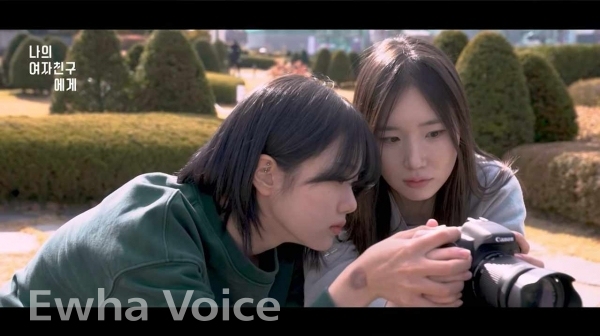
In just a few decades, queer representation in Korean media has made significant gains. While queer content was considered strange and unfamiliar in the Korean media industry only a few years ago, an increasing number of TV shows and films now feature lesbian, gay, bisexual, transgender, and questioning (LGBTQ) characters and actors. With Pride Month internationally celebrated in June, Ewha Voice sat down with ‘EWHA With U’, the school’s promotional YouTube video club.
From “Mine,” in which the main character is homosexual, to “Semantic Error,” which is about a gay couple, a wide range of queer content has appeared in the Korean media. While it is true that queer content did exist in Korea in the past, the biggest difference past to present lies in representation. Unlike the past, when queer characters were generally depicted comically or as substitute characters, they are now illustrated as three-dimensional characters who take a large part in TV shows and movies.
One potential reason for the rise of queer content lies in the intense competition between OTT platforms. Content aired on these platforms enjoys greater artistic freedom and relatively less censorship. Thanks to the increase in the diversity of content, audiences have a chance to experience stories that are innovative and unbiased.
The increase in queer content has also made waves at Ewha. EWHA With U started with students who gathered to overcome prejudice against Ewha and capture the various voices of students. From “Is there a College Couple at a Women’s University,” which gained much attention and love two years ago, EWHA With U made a queer web drama “Dear My Girl Friend,” which reached 9 million views.
Kim Kwang Ok, the eighth president of EWHA With U, shared her opinions on the rise of queer representation in the media.
“As our goal is to break the bias against Ewha, there has been an idea to drive out the prejudice that there are no campus couples at Ewha,” Kim said. “Since the release of the trailer for ‘Is there a College Couple at a Women’s University,’ it has attracted a lot of attention. More than 900 people participated in the vote to guess Hanul’s lover. Even though there were some negative comments such as Ewha being a Christian school, most of the audience was positive and supportive.”
A student who introduced herself as bisexual and wished to stay anonymous mentioned her opinion on the rise of queer content in Korean media.
As a bisexual, she mentioned that she empathized with the drama “Nevertheless.” The drama features two female side characters Yoon Sol and Seo Ji-wan, take on the friends to lovers trope. The relationship between Sol and Ji-wan is portrayed as two friends who begins to acknowledge their feelings for one another, with one fearing that their feeling will come at the cost of their friendship. While she was disappointed with the relatively short screen time of the couple, she stated that the relationship reminded her of her past experience of figuring out her sexual orientation.
“Such representation of queer content in drama differs greatly from books or news spreading queer-friendly culture in that it enables empathy,” she said. “Contents like dramas and movies help people see LGBTQ as ‘us’ not ‘them.’ It enables people to empathize better with the characters themselves.”
When asked about queerbaiting, a tactic used by the media to draw queer audiences, she mentioned that it is ultimately very harmful. Queerbaiting is when the media hints queerness but does not actually include explicit romantic relationships between characters. She states that viewers, especially those who are queer, are attracted to such implications, but end up being disappointed. By highlighting that queer folks do not often have relationships that reflect back a whole lot, she states that such tactic can seriously harm them since queer people tend to see the characters as their possibility models.
“It is true that the sharing of controversial content and minority viewpoints are being promoted,” she said. “Nonetheless, there is still a room for improvement. Homosexual rights are still contentious in Korea and it is crucial for the media to precede efforts to secure queer rights and achieve constructive change in the future.”

